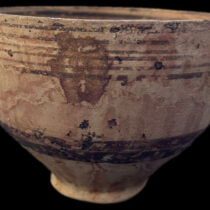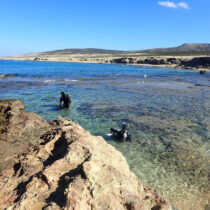This collaboration between the Hellenic Ministry of Culture, the Acropolis Museum, the Ephorate of Antiquities of Athens, and NEON Organization initiates a deep and meaningful dialogue between contemporary works and ancient artefacts. This partnership underscores enduring themes of cultural heritage, loss and restitution, survival, and the ongoing creation of culture. The result is a trilogy that will be unfolding during 2025 and 2026.
At its core is the multidimensional work of internationally acclaimed contemporary artist Michael Rakowitz whose art engages with ancient Greek antiquities and artefacts from ancient civilisations of the southeastern Mediterranean and the Middle East. The trilogy starts in 2025 at the Acropolis Museum, continues in the museum’s western exterior area leading to Mitseon Street, and concludes in 2026 at the Old Acropolis Museum on the Acropolis Hill.
The power of this collaboration between archaeology and contemporary art lies in its capacity to challenge dormant or seemingly distant historical narratives. Ancient exhibits are shown in a new light through interventions of recent works that contextualise the complexity and continuity of cultural heritage, interweaving diverse experiences, identities, and memories. This initiative is an urgent call to preserve humanity’s shared cultural history at the same pace at which it is being lost.
The trilogy represents a dialogue rich in concepts, emotion, and political resonance – deeply relevant to our times. The works recall recurring traumatic historical events – war, looting, theft, colonialism, and migration – while drawing attention to the present-day fate of war-torn regions and the forgotten journeys of displaced peoples and cultural treasures. The trilogy unites classical and contemporary cultures of this region within the Acropolis Museum, extending to the Rock of the Acropolis and the Parthenon, an emblem of Western civilisation. It represents the dynamic interplay of civilisations that have shaped both the classical and modern worlds.
Lina Mendoni, Minister of Culture, states: “The collaboration between the Hellenic Ministry of Culture and NEON has consistently demonstrated its value in recent years. Contemporary artworks are placed at carefully chosen archaeological sites,in a constructive dialogue, enriching the continuity and timeless depth of Greek culture. Our collaboration on this trilogy is even more robust and focused. A remarkable civilisation – that of the Assyrians, among the oldest of the Mediterranean civilisations – enters into a harmonious dialogue and creative synergy with Greek antiquities and with the modern creations of Michael Rakowitz, who draws inspiration from the biblical kingdom of ancient Assyria and its enduring masterpieces of Mesopotamian art. Tragically, some of these works have only recently suffered looting and destruction.Many, either intact or in fragments, were stolen and violently removed from the places that created them. Beyond all the other multiple meanings of the trilogy, it directly alludes to the destruction and violent seizure of the Parthenon Sculptures. Our political priority is to foster the fusion of cultural heritage and contemporary creativity, and to amplify the outward reach of Greek culture. These priorities are fully embodied in this collaboration of the Ministry of Culture and NEON. I especially thank Dimitris Daskalopoulos for his steadfast creative partnership and generosity. Michael Rakowitz’s inspired creations, serve as a unified thread for this trilogy. Warm congratulations to the exhibition curators – Professor Nikos Stampolidis, Director General of the Acropolis Museum, and Elina Kountouri, Director of NEON – for this outstanding exhibition of multiple meanings at the Acropolis Museum. I also thank the Ephorate of Antiquities of the City of Athens and its head, Elena Kountouri and the Ministry’s officials for their exceptional work at the Old Acropolis Museum, which will reopen to the public in 2026 with three new exhibitions.”
Dimitris Daskalopoulos, Founder of NEON, adds: “The collaboration between NEON with the Ministry of Culture, the Acropolis Museum and the Ephorate of the City of Athens marks our long-term engagement with contemporary art and heritage. My interest lies in exploring and supporting new methods of civic engagement and I believe that the work of Michael Rakowitz in relation to ancient cultures will support our consistent efforts to make art more accessible to a wider local and international public and its ideas more impactful. I extend my heartfelt thanks to the Hellenic Ministry of Culture, Minister Lina Mendoni, the Acropolis Museum Board of Directors and its Director General, Professor Nikolaos Stampolidis and, of course, to Michael Rakowitz.”
Public Programme
Allspice | Michael Rakowitz & Ancient Cultures
Acropolis Museum and NEON
13 May, 6:30 pm |Lecture
Of Gods and Kings: The Material Legacy of Mesopotamia, Eternal Yet Fragile
Kiersten Neumann, PhD, Curator, Research Associate, Lecturer, Institute for the Study of Ancient Cultures & Department of Art History, University of Chicago.
Moderated by Rachel Donadio, Journalist & Public Programme Advisor
Location | Acropolis Museum (auditorium “Dimitrios Pantermalis”) | Free Entrance
The land between the two rivers, the cradle of civilization, the fertile crescent, the birthplace of great empires—Mesopotamia is known by many names. Yet these only begin to capture a land deeply inscribed with a rich tapestry of peoples, places, and enduring legacies. From the votive-filled mudbrick temples of the Early Dynastic period to the richly adorned monumental palaces of the Neo-Assyrian Empire, from portable stone statues to colossal guardian figures, from colonial-era excavations to modern exhibitions and ongoing preservation initiatives, Mesopotamian objects and their material worlds tell a story of cultural traditions, political power, economic networks, artistic ingenuity, and resilient identities layered across time.
This talk traces the intricate journey of these artifacts—from their creation and significance in antiquity to their modern rediscovery, from scholarly study and public display to widespread displacement, irreparable destruction, and the determined efforts to preserve them. In dialogue with the Allspice exhibition at the Museum of the Acropolis, it further reflects on the persistence of cultural memory and critical artistic engagements—among them The invisible enemy should not exist, the ongoing project of Iraqi-American artist Michael Rakowitz, that confronts erasure and reimagines Mesopotamia’s enduring presence in the modern world.
17 May, 6:30 pm | Conversation
Artist Michael Rakowitz in conversation with Elina Kountouri, one of the exhibition’s two curators
Moderated by Rachel Donadio, Journalist & Public Programme Advisor
Location | Acropolis Museum (auditorium “Dimitrios Pantermalis”) | Free Entrance
As part of the exhibition Allspice, the Iraqi-American artist Michael Rakowitz will discuss with one of the exhibition’s two curators, Elina Kountouri, Director of NEON. The discussion will be moderated by Rachel Donadio, journalist and advisor to the exhibition’s public program.
The conversation will explore Rakowitz’s multifaceted practice, which engages in dialogue with antiquities from the Middle East and the southeastern Mediterranean. His work addresses themes of loss and restoration, as well as the formation of new cultural identities. Rakowitz’s deeply political practice spans the past three decades and encompasses a range of media, including sculpture, film, performative actions, and installations.
21 May, 9 pm | Film Screening
PERSEPOLIS, Marjane Satrapi | A collaboration between NEON, the Acropolis Museum and Cinobo
Location | Cine Paris (Kydathinaion 22, Plaka, Athens) | Free Entrance. Pre-reservation required. Reservations open on 14 May at more.gr
NEON, the Acropolis Museum and Cinobo present a special open-air screening of Persepolis (2007), the animated film adaptation of Marjane Satrapi’s autobiographical comic book. The screening is part of the public program for the exhibition Allspice | Michael Rakowitz and Ancient Cultures, held at Cine Paris.
Using a distinctive black-and-white animation with personal storytelling, Persepolis portrays Satrapi’s youth in Iran during the Islamic Revolution and her later experiences in exile. The film explores themes of identity, resistance, and the impact of political unrest on personal freedom. It has received international recognition, including the Jury Prize at the Cannes Film Festival and an Academy Award nomination for Best Animated Feature.
Full description of images:
Fig. 1. The Invisible Enemy Should Not Exist (Room G, Northwest Palace of Nimrud, Panel 23), 2019. Relief from Middle Eastern packaging and Arabic-English newspapers, glue, cardboard on wooden structures, museum label (detail); 238 x 222 x 9 cm. Consignment to Acropolis Museum, Athens. Centre national des art plastiques. Allspice | Michael Rakowitz & Ancient Cultures, 2025 | Installation view | A collaboration between NEON + the Acropolis Museum | Photography © Natalia Tsoukala | Courtesy ΝΕΟΝ, the Acropolis Museum and the artist
Fig. 2. Portrait of Michael Rakowitz. Bearded male head wearing a wreath of laurel leaves
Department of Antiquities of Cyprus (on a long-term loan: Museum of Cycladic Art, Athens – Ζ0351). Michael Rakowitz, Study for a Lamassu in spolia, 2025, Pen on plexiglass. Courtesy the artist, commissioned by NEON Organization. Allspice | Michael Rakowitz & Ancient Cultures, 2025 | Installation view | A collaboration between NEON + the Acropolis Museum | Photography © Natalia Tsoukala | Courtesy ΝΕΟΝ, the Acropolis Museum and the artist








